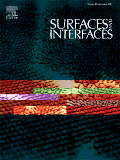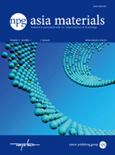
Interdisciplinary Materials
Scope & Guideline
Connecting Researchers to Transformative Materials Insights
Introduction
Aims and Scopes
- Advanced Materials for Energy Storage and Conversion:
Research on innovative materials and methods for improving the efficiency and performance of energy storage devices, such as batteries and supercapacitors. - Biomaterials and Biomedical Applications:
Development of new biomaterials for medical applications, including drug delivery systems, tissue engineering, and diagnostics. - Nanomaterials and Nanotechnology:
Exploration of nanostructured materials and their unique properties, leading to advancements in electronics, catalysis, and environmental applications. - Sustainable and Recyclable Materials:
Focus on materials that are environmentally friendly, recyclable, or derived from renewable sources, addressing the challenges of waste and sustainability. - Interfacial and Surface Engineering:
Research on the manipulation of surfaces and interfaces to enhance material properties and functionalities, particularly in electronic and energy applications. - Computational Materials Science:
Utilization of computational methods and machine learning to predict material behaviors and design new materials with desired properties.
Trending and Emerging
- Smart and Responsive Materials:
There is a growing interest in materials that can respond to environmental stimuli, such as temperature, pH, or light, which are critical for applications in sensors and actuators. - Electrochemical Energy Systems:
Research on electrochemical systems, particularly regarding lithium-ion and sodium-ion batteries, is trending, driven by the demand for efficient energy storage solutions. - Biomimetic and Bioinspired Materials:
An increasing trend towards materials inspired by biological systems is evident, with applications in medicine, engineering, and environmental sustainability. - 3D Printing and Additive Manufacturing:
The rise of 3D printing technologies is reflected in the journal's publications, focusing on novel materials and processes that enable complex geometries and functionalities. - Integration of AI and Machine Learning in Materials Science:
The incorporation of artificial intelligence and machine learning techniques for materials discovery and design is emerging as a crucial area, enhancing research efficiency and innovation.
Declining or Waning
- Traditional Bulk Materials:
Research on conventional bulk materials appears to be declining, as the field shifts towards more innovative, composite, and nanostructured materials that offer enhanced properties. - Basic Theoretical Studies:
There seems to be a waning interest in purely theoretical studies without practical applications, as researchers increasingly seek to connect theoretical insights with experimental validation and real-world applications. - Single-Use Materials:
The focus on materials designed for single-use applications is fading in favor of developing multifunctional and sustainable materials that can serve multiple purposes and reduce waste.
Similar Journals

BULLETIN OF MATERIALS SCIENCE
Fostering Excellence in Material Science ResearchBulletin of Materials Science, published by the Indian Academy of Sciences, is a distinguished journal that has been contributing to the field of materials science since its inception in 1979. With an ISSN of 0250-4707 and E-ISSN 0973-7669, it provides a platform for researchers to share groundbreaking studies and advancements in the mechanics of materials and general materials science. As of 2023, the journal holds a respectable Q3 ranking in both the Materials Science (miscellaneous) and Mechanics of Materials categories, highlighting its competitive position in the academic landscape. Although the journal currently does not operate under an open access model, it remains a vital resource for professionals and students keen on exploring innovative material developments and methodologies. With a commitment to promoting high-quality research, the Bulletin of Materials Science features rigorous peer-review processes, making it an essential reference for anyone engaged in the materials science domain.

Surfaces and Interfaces
Connecting Disciplines through Surface InsightsSurfaces and Interfaces is a leading international journal published by Elsevier, dedicated to advancing the understanding of surface and interfacial phenomena across various disciplines, including chemistry, materials science, and physics. With an impressive impact factor placing it in the Q1 quartile for its categories as of 2023—spanning Chemistry, Condensed Matter Physics, and Surfaces, Coatings, and Films—this journal not only serves as a critical platform for innovative research but also reflects the dynamic nature of surface science in contemporary applications. The journal is indexed in Scopus, ranking 25th out of 132 in the Materials Science – Surfaces, Coatings and Films category, marking it in the top 19% of this prestigious field. Although it is not an open-access platform, the journal remains a vital source of curated academic material for researchers, professionals, and students seeking to deepen their knowledge and contribute to ongoing conversations in surface and interface science. Published from the heart of Europe in Amsterdam, Surfaces and Interfaces invites submissions that challenge conventional paradigms and explore the forefront of technology and materials.

ADVANCED MATERIALS
Connecting Ideas, Driving Innovation in Materials ScienceAdvanced Materials, published by Wiley-VCH Verlag GmbH, is a premier academic journal that serves as a crucial platform for cutting-edge research in the field of materials science and engineering. With an impressive impact factor and ranking among the top tiers in various categories, including Materials Science, Mechanical Engineering, and Nanoscience, this journal is recognized for its high-quality contributions and relevance to contemporary research challenges. Spanning from 1989 to 2024, Advanced Materials not only features groundbreaking studies but also provides insights into innovative applications and advancements in material design and engineering. Researchers, professionals, and students alike will benefit from the rigorous peer-review process and diverse range of topics covered, making it an indispensable resource for those aiming to stay at the forefront of materials science innovation.

Materials Today Advances
Pioneering the intersection of materials science and engineering.Materials Today Advances is a premier open access journal, published by Elsevier, dedicated to disseminating cutting-edge research in the fields of Materials Science and Mechanical Engineering. Since its inception in 2019, the journal has quickly established itself within the academic community, achieving an impressive Q1 quartile ranking in both disciplines as of 2023, indicative of its high-impact contributions. Ranked #25 out of 672 in Mechanical Engineering and #46 out of 463 in General Materials Science according to Scopus, Materials Today Advances offers rigorous peer-reviewed articles that address the latest innovations and interdisciplinary approaches. Researchers, professionals, and students can benefit from the journal's open access model, ensuring widespread visibility and accessibility of groundbreaking findings. With the convergence of advanced materials research and practical applications, this journal represents a vital resource for those at the forefront of scientific discovery.

ADVANCED FUNCTIONAL MATERIALS
Shaping the Future of Materials Through Rigorous ResearchADVANCED FUNCTIONAL MATERIALS is a leading journal published by WILEY-V C H VERLAG GMBH, prominently recognized in the fields of biomaterials, chemistry, condensed matter physics, and materials science. With an impressive impact factor and a distinguished position in the Q1 quartile across multiple categories including nanoscience and nanotechnology, this journal serves as a vital platform for researchers and professionals committed to innovating in functional materials. Since its inception in 2000, ADVANCED FUNCTIONAL MATERIALS has published high-quality peer-reviewed articles that push the boundaries of materials science, exploring new frontiers in electronic, optical, and magnetic materials. The journal's dedication to open access ensures that its groundbreaking findings are readily available to a global audience, fostering collaboration and knowledge-sharing among scholars and practitioners in the field. For those seeking to stay at the forefront of materials research, ADVANCED FUNCTIONAL MATERIALS is an essential resource.

SmartMat
Pioneering Open Access Research in Smart Materials.SmartMat is a cutting-edge, peer-reviewed academic journal published by WILEY, dedicated to the fields of Chemistry, Materials Science, and Mechanics of Materials. Launched in 2020, this Open Access journal aims to disseminate high-quality research and innovative findings that bridge these interdisciplinary areas. With an impressive impact factor reflecting its strong scholarly influence, SmartMat currently holds the prestigious Q1 category ranking in key domains such as Chemistry (miscellaneous), Materials Science (miscellaneous), and Mechanics of Materials, underscoring its relevance and importance in advancing material research. The journal is ranked among the top in its fields on Scopus, with 98th and 97th percentiles for Engineering and Chemistry rankings, respectively. Researchers, professionals, and students looking for a platform to share advancements in smart materials and their applications are encouraged to explore the wide-ranging access options available, enhancing visibility and engagement with global scientific communities.

Frontiers in Materials
Driving Progress with Open Access Research.Frontiers in Materials, an esteemed journal published by FRONTIERS MEDIA SA, is a leading platform in the field of Materials Science, with a notable impact factor placing it in the Q2 category of its discipline as of 2023. Since its establishment as an Open Access journal in 2014, it has fostered considerable academic exchange, allowing researchers from around the globe to share their innovative findings and insights. Based in Lausanne, Switzerland, this journal not only emphasizes high-quality peer-reviewed articles but also prioritizes rapid dissemination of research, as evidenced by its commendable Scopus ranking of #62 out of 196 in Materials Science (miscellaneous). By consistently striving to bridge the gap between academia and practical applications, Frontiers in Materials serves as an invaluable resource for researchers, professionals, and students seeking to delve into cutting-edge advancements and transformative applications in materials science.

Energy & Environmental Materials
Transforming Research into Real-World ImpactEnergy & Environmental Materials, published by WILEY, is an esteemed academic journal dedicated to pioneering research in the multifaceted domains of energy, environmental science, and materials science. Since its inception in 2018, this journal has rapidly established itself as a leading platform, holding a prestigious Q1 ranking across multiple categories including Renewable Energy, Sustainability, and Waste Management, reflecting its significant contributions to advancing knowledge in these critical areas. With a robust Scopus ranking that positions it in the top percentile for Environmental Science and Materials Science, it caters to a diverse audience of researchers, professionals, and students seeking cutting-edge findings and practical applications in energy efficiency and sustainable materials. This open-access journal facilitates the dissemination of innovative research and aims to bridge the gap between scientific exploration and real-world solutions for a sustainable future. The editorial team encourages submissions that explore both theoretical and practical aspects, ensuring that every publication not only contributes to the academic landscape but also drives impactful change in energy and environmental practices.

NPG Asia Materials
Advancing the Frontiers of Materials ScienceNPG Asia Materials, a premier journal published by NATURE PORTFOLIO, stands at the forefront of research in the fields of condensed matter physics, materials science, and modeling and simulation. With an impressive Impact Factor gracing its Q1 rankings in 2023, this open-access journal, established in 2012, offers a vital platform for disseminating high-quality research articles, reviews, and perspectives that advance the understanding of material properties and innovative applications. Based in the United States and catering to a global audience, NPG Asia Materials features cutting-edge contributions that not only enhance academic scholarship but also provoke discussions relevant to both industry and academia. Researchers, professionals, and students are invited to explore its extensive archive of work, covering insights from 2009 to 2024, in a bid to stay abreast of the latest developments in these rapidly evolving scientific domains.

Annual Review of Materials Research
Connecting Theory to Application in MaterialsThe Annual Review of Materials Research, published by ANNUAL REVIEWS, is a pivotal journal in the realm of Materials Science, recognized for its rigorous reviews that bridge the gap between foundational research and advanced applications. With a prestigious ranking of Q1 in the category of General Materials Science and a commendable position at #24 out of 463 in Scopus, it ranks in the 94th percentile among its peers, underscoring its significance and influence in the field. Over the years, from 2003 to 2023, the journal has become an essential resource for researchers, professionals, and students alike, offering comprehensive insights into the evolving landscape of materials science. Although it does not operate under an open access model, its content remains invaluable for advancing knowledge and fostering innovation. The journal’s scope encompasses a wide array of interdisciplinary topics, making it a go-to source for those seeking to stay at the forefront of materials research.